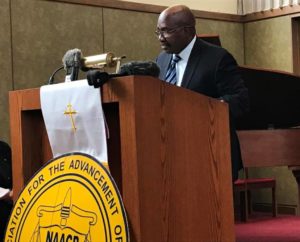
Rev. Rodney Williams, president of the Kansas City NAACP branch, and other organization leaders urged Gov. Eric to veto SB 43. (Photo by Laura Ziegler/KCUR 89.3).
National delegates for the NAACP voted Wednesday, July 28, to move forward with a travel advisory warning nonwhites, women, members of the LGBTQ community and persons with disabilities to practice extreme caution while in Missouri because “they may not be safe.”
The warning comes in response to recent legislation signed by Gov. Eric Greitens that Springfield NAACP president Cheryl Clay says diminishes civil rights protections for local employees and whistleblowers.
“Our ongoing issues of racial profiling, discrimination, harassment and excess violence towards people of color have been further exacerbated by the passage, and signing of [Senate Bill] 43,” Clay said in an emailed statement to the Springfield News-Leader.
The bill, signed into law on June 30, modified the Missouri Human Rights Act to make it more difficult to prove housing and employment discrimination in the courts. Clay added that now it would be nearly impossible to file and win a discrimination case.
Among other things, the NAACP’s advisory cited issues pertaining to “racial [and] ethnic disparities in education, health, economic empowerment and criminal justice,” a slew of racially charged incidents at the University of Missouri in Columbia in recent years, and a lawmakers’ comments on the House floor that asserted there was a “distinction between homosexuality and just being a human being,” according to the newspaper.
The organization also pointed to a recent report from Attorney General Josh Hawley’s office that showed Black drivers in Missouri were 75 percent more likely to be stopped by police than their white counterparts.
“We as a city need to recognize that we have to be able to attract and keep quality officers,” Clay told the News-Leader.
“Not all the communities have the desire or the will to do the right thing for people in their community,” she added. “Thus, this is why Missouri has earned the travel advisory for the whole state.”
Missouri NAACP President Rod Chapel told the Associated Press that the advisory was adopted on a statewide level in June. Now, the organization’s national board is set to decide whether to ratify it in October.


